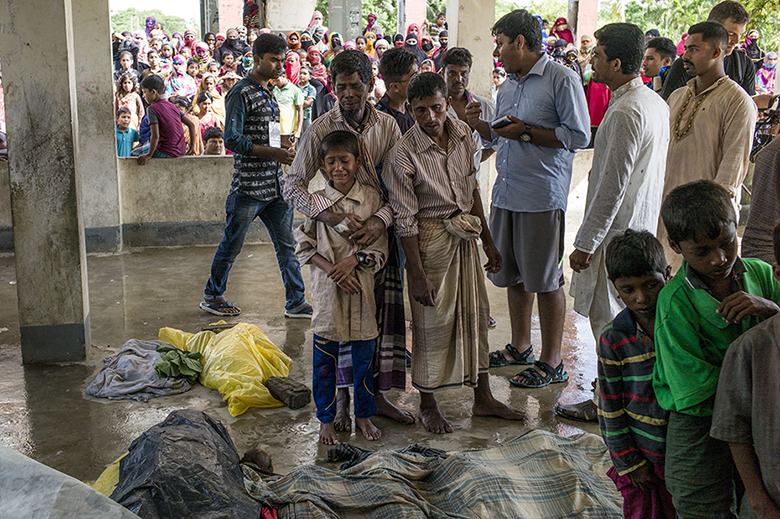Crisis of Refugees, From Region To Region
"[...There is] a deeply disturbing pattern to the violence and ensuing large movements of an ethnic group from their homes."
"Displacement appeared to have continued with reports of the burning of Muslim villages, as well as looting and acts of intimidation."
"[Rohingya] are outnumbered by Rakhine communities, some of whom have engaged in violent acts of vigilantism against their Muslim neighbours."
"It is imperative that United Nations agencies and our non-governmental partners be granted immediate and safe access to all affected communities."
"[This represents] the world's fastest developing refugee emergency and a humanitarian and human rights nightmare."
"[The crisis] has generated multiple implications for neighbouring states and the larger region, including the risk of intercommunal strife."
U.N. Secretary-General Antonio Guterres
 |
| Rohingya refugees mourn beside the bodies of relatives who died when a boat capsized. (Fred Dufour/AFP/Getty Images) |
From Saudi Arabia to Indonesia, there are murmurings of unrest. Not, mind, efforts to extract the Burmese Rohingya fleeing deadly persecution out of Myanmar and into Saudi Arabia, Indonesia, Malaysia, or Turkey, for example, but stirrings of jihad, of groups to pledge their part in the restoration of Muslim honour and commitment to come to the aid of fellow Muslims in dire straits. It is the breath of life to Islamofascist terror groups, yet another call to arms in defense of Islam against the unbelievers.
That fear, of a swell of vengeance-seeking Islamist jihadis coursing their way toward Myanmar and engulfing the region in a reactive war of revenge to redeem Islam, has Mr. Guterres quaking in his UN boots that another brutal dysfunction similar to those afflicting the Middle East is on the cusp of erupting. Because a Buddhist society feels umbrage at the abrasive presence of Muslims in their midst, identifying them as intruders who had long ago settled, uninvited in Burma, and eager to return them to neighbouring Bangladesh.
Alternatively a tiny proportion of the untold wealth of the Persian Gulf oil-rich states could conceivably be on offer to penurious Bangladesh to enable it to house and feed and welcome the desperate Rohingya fleeing death in Myanmar. But no, the Muslim world seethes with rage but will not part with any of its wealth even to bolster the strained capability of another Muslim country less fortunate than they are; so much for the munificence of Islamic charity. Of course the UN will not ask pointedly that Muslim wealth rescue Muslim refugees.
It is the fear of radicalization, of criminals and human traffickers moving in to take advantage of this dread situation of almost a half-million desperate people fleeing the violence that threatens them that offers sleepless nights to Secretary-General Guterres in prosecuting to the best of his ability a charge implicit in the authority vested in him, representing a flawed and failed world body that is the United Nations, whose purpose is to unify and to strive toward humanitarian equality.
The appeal to the UN Security Council to exert its own authority to persuade Myanmar authorities to allow "unfettered access" for humanitarian aid to reach the refugees, and to make possible "the safe, voluntary, dignified and sustainable return" of those Rohingya whose fear for ed them to seek refuge across the border into Bangladesh, is unlikely to accomplish much. And in a reprise of the mass exodus of the underprivileged Muslim hordes from North Africa and the Middle East flooding Europe and dying at sea, so too are the fleeing Rohingya vulnerable to the very same threats.
As for Bangladesh, it has already absorbed hundreds of thousands of Rohingya who had arrived years before and still languish in refugee camps. Camps now burgeoning with the excess of newly-arrived refugees for whom there is no more room, forcing them to camp out with no protection from the elements anywhere they can find space, in fields, by the sides of roads, and begging for food.
The United Nations has called for financial support from its members in the amount of $77 million, of which under half has been received, to enable it and its partners in humanitarian assistance to answer to the needs of these people. But even that original estimate has changed; "the scale of the emergency has far surpassed initial projections and the needs are being revised" upward, stated UN deputy spokesman Farhan Haq of "the largest mass refugee movement in the region in decades".
Labels: Bangladesh, Conflict, Myanmar, Persecution, Refugees, Rohingya, United Nations

<< Home